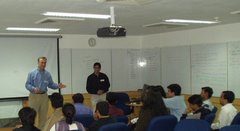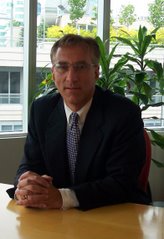Here is something that many people don't know - but many of us hope for. To be great, you don't have to be born with it. Greatness "ain't innate."
Many people don't even try - or if they do - they don't try hard enough. They say to themselves, "Why even bother. If I am not born with brains and beauty - I can never be successful." So most people avoid the thought of embarrassing themselve and trying to be great.
Geoffrey Colvin wrote a great article http://biz.yahoo.com/weekend/great_1.html that should give all of us the excitement and energy and most importantly the nerve to try and become more than we are - (please read this article, it's what I have been telling EVERYONE for the past 18 years http://biz.yahoo.com/weekend/great_1.html ).
(I first came across the idea and concept of becoming good at something from Brian Tracy http://www.briantracy.com/ . If you do want to see something on "how to become good or great in your field watch his Pathways to Personal Progress. (more on Brian Tracy in a later Blog report)
Back to the story . . .
British-based researchers Michael J. Howe, Jane W. Davidson and John A. Sluboda conclude in an extensive study, "The evidence we have surveyed ... does not support the [notion that] excelling is a consequence of possessing innate gifts."
Hard Work and "Deliberate Practice"
The first major conclusion is that greatness isn't handed to anyone; it requires a lot of hard work. HARD work. Colvin says something I disagree with - he says essentially, a lot people work hard. I think people work, but they waste a lot of time and energy on things that don't matter. The researchers - and to be fair Colvin points this out - "The best people in any field are those who devote the most hours to what the researchers call 'deliberate practice.' It's activity that's explicitly intended to improve performance . . ."
The Importance of Important Work
It is this "deliberate practice" on the work that is important to that field that I believe makes the critical difference in becoming great in your field or area of business. Professor Ericsson from Florida State University notes, "Elite performers in many diverse domains have been found to practice, on the average, roughly the same amount every day, including weekends." That is, they practice on average "10,000 hours of deliberate practice." That's 250, 40 hour weeks of deliberate practice on the right/important things. That's about 5 years of deliberate practice. The next-best averaged 7,500 hours; and the next, 5,000 hours.
What About Child Prodigies?
Sure, there are exceptions. What about the child chess prodigy? Well Bobby Fischer was thought to be the child chess prodigy as so many Russians were back in the 1960's to 1990's except for one small thing - they learned chess early and practiced every day for - like in the case of Bobby Fischer - for 7 years - except little Bobby practiced sometimes 16 hours a DAY, seven days a week - intensely!
But there are exceptions. Everyone learns atdifferent rates, someone may learn at a faster rate. And they may study and deliberately practice the more important and critical points. This is not to argue that we all are the same. The point is - we all can become great at something through practice - and over time.
Some How Do You Apply "Deliberate Practice?"
Here's how; you create the practice in your work, which requires thinking about what you are doing with the mindset of "how do I become better at this?" not just "how can I get this done?".
So instead of merely trying to get it done, aim to get better at it.
What Are The Essentials of Your Job?
But I would determine first - what are the most critical elements of your job? And focus on getting better at the critical things. There are about 5 to 7 areas that are critical to each and every job. And those areas have specific tasks that make up that area or category. But make sure they are the critical things; getting better at making copies by standing at a copy machine will not help you - except out the door. Okay, now that was an extreme example, but you get the point.
Why Feedback Is An Essential To Getting The Essentials of Your Job Right
Colvin points out that feedback is another essential. I agree. Thinking you are doing a good job is different than what your boss or clients think. You may be working really hard on something that doesn't matter to them. Or you may think you're doing the thing right - and you are not.
Anyway, the point is "Ask." Also, a lot of successful people had and still have "advisors" or mentors - who in terms of feedback - provided it.
See Your Work From A Strategic Vantage Point
Also - think of the elements of your job - as pieces of a large jigsaw puzzle. See how each fits together - as if you are standing above it looking down. Once you've done that - look to see the other parts of the company fit together - and then add your job to the puzzle. And then look to see how the outside influences your company and job. You will be able to see how your job could change or how you could adapt your job over time because of the outside influences on your company.
Last, there is no way for you to become better with deliberate practice without getting excited about "getting better." You need passion to want to deliberately practice. And the best way to get passion is to see yourself as becoming one of the best - because not everyone will want to nor understand that they can (because they haven't read this post!).
Try these ideas at work - every day - for the next five years. And call me in the morning.
Monday, October 23, 2006
The Success Secret - Revealed - You don't have to be born with it!
Posted by
Joe
at
12:53 PM
1 comments
![]()
Friday, October 06, 2006
OK - Why Do Most Technical People Believe Selling Is Easy?
I am not sure why so many technical people who have never sold, never presented in front of group of people or never will be able to lead silent prayer in a phone booth are so certain selling is so easy.
Here is a good one. I met a vice president of sales for a company based on the west coast for lunch. I offered to help because a friend referred him to me.
The company was looking to expand in Atlanta Georgia. Probably the toughest market to crack in terms of IT services sales. Companies like Unisys, IBM, CSC, Keane, Perot and others have suffered. Some have opened and closed doors on multiple occasions. The point is - it's tough selling here.
Anyway, back to the lunch. I ask this VP how long he's been in sales. He replies, "I never really was in IT services sales. I was an auditor and I came in and was able to help open up our west coast office, it grew, so they promoted me to VP of Sales, because there wasn't one.
I said, "Now isn't that an interesting strategy." Not a question - just a statement.
I then asked, "What kind of sales people are you looking for."
His reply - and you experienced sales professionals are going to love this - "I want a hard working sales person, who has a Rolodex of people who can get us appointments and close business."
I looked at him and started to stare. I said, "Do you mind if I get out my pen? I have just got to capture this." I then asked, "Why would someone who has the contacts and has the ability to close business and get appointments come to your company?
He said, "Well, because we have a really good offering and service."
I said, "That's great. So what does your service do? What makes it so great?"
He said, "You really ask tough questions."
I said "The sales people I know who you might want to come work for you are going to asking the same thing. If you cannot answer this - they will not come and join you. Sso what will make them jump?"
"We pay a great commission," he said.
I said, "Well what does the pay structure look like?"
He hemmed and hawed and said, "Anything we need it to be."
"How about $150,000 base? Is that right?" I asked
"I am not sure." was his reply.
This was obviously a pitiful conversation from a person who never sold, does not know what it will take to drive sales and develop a marketing strategy for the territory. Selling is so easy - that I have the easiest of all tests. I ask technical people to go grab their phone and get me two appointments. I'll give you two days. Three if you really need it. But the meetings have to be with someone who has a need and is going to buy something in the next six months.
The truth is - I never hear from the people again. And if I do see them, I ask them, do we have that appointment yet? Of course this is not my best Dale Carnegie impression.
Posted by
Joe
at
9:26 PM
0
comments
![]()
Wednesday, October 04, 2006
Software as a Service - The Old ASP is Dead - SaaS is not!
With the convergence of business users wanting to reach a larger population of their target markets Software as a Service (SaaS) may provide the vehicle to reach many new smaller customers and turn them into clients at a very small cost.
Many people see SaaS as the old ASP model reborn. This in fact not the case.
Many people see SaaS as just for independent software vendors to selling their solution to smaller end-users. This is partially the case.
What many people do not know is companies like Google, eBay, Amazon.com and others have given end-users, prospective customers and hard to reach markets around the world an opportunity to buy things that they cannot find at Barnes and Noble, Walmart and other brick and mortar stores (Geez the term brick and mortar - do we dare use it and tempt the fate of the .com implosion?).
This time the .com thing is different.
Now companies and individuals from around the world can leverage SaaS to reach a larger global population that would have been impossible to reach. Think eBay. eBay is selling stuff from China at pennies on the dollar. I bought an iPod FM car converter for $10. It works great! Shipping was $15 though. But now a Chinese person can sell from their apartment through eBay and reach the US market without much trouble except for - of course shipping. I bought more cool things from China that worked perfectly.
Never before has this been available - so think about how YOU might be able to use this.
Posted by
Joe
at
7:42 AM
0
comments
![]()








